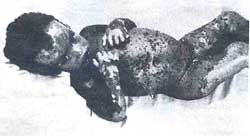Healthy progress
 MANY southeast Asian countries, including India, have been able to control several nutritional diseases such as kwashiorkor, beriberi and pellagra.
MANY southeast Asian countries, including India, have been able to control several nutritional diseases such as kwashiorkor, beriberi and pellagra.
Kwashiorkor, a form of malnutrition caused by protein deficiency, is especially prevalent among children. Pellagra, a disease caused by a deficiency of vitamins found in milk, liver and yeast, is characterised by the skin cracking and often results in insanity. Osteomalacia, or softening of the bones, is often caused by a defi6ency of vitamin D and calcium and was once fairly widespread in north, India. Former ICMR director-general C Gopalan confirms kwashiorkor has viritually been eliminated in India and there are indications that both pellagra and oste6malacia have significantly declined.
Beriberi, which causes inflammation of the nerves, results from a deficiency of vitamin B1, and used to be widespread on the east coast of India and in Myanmar (Burma), Thailand and the Philippines. In a report prepared for the World Health Organisation, Gopalan reports the disease and fulminant forms of vitamin B complex deficiency "have now ceased to be important" and are no more a major public health problem.
Related Content
- World health statistics 2025: Monitoring health for the SDGs, Sustainable Development Goals
- Regional overview of food security and nutrition in Africa 2023: statistics and trends
- Regional overview of food security and nutrition in Europe and Central Asia 2023: statistics and trends
- Renewables 2023 global status report: economic and social value creation
- The state of food security and nutrition in the world 2023: urbanization, agrifood systems transformation and healthy diets across the rural–urban continuum
- Striving for clean air: air pollution and public health in South Asia
